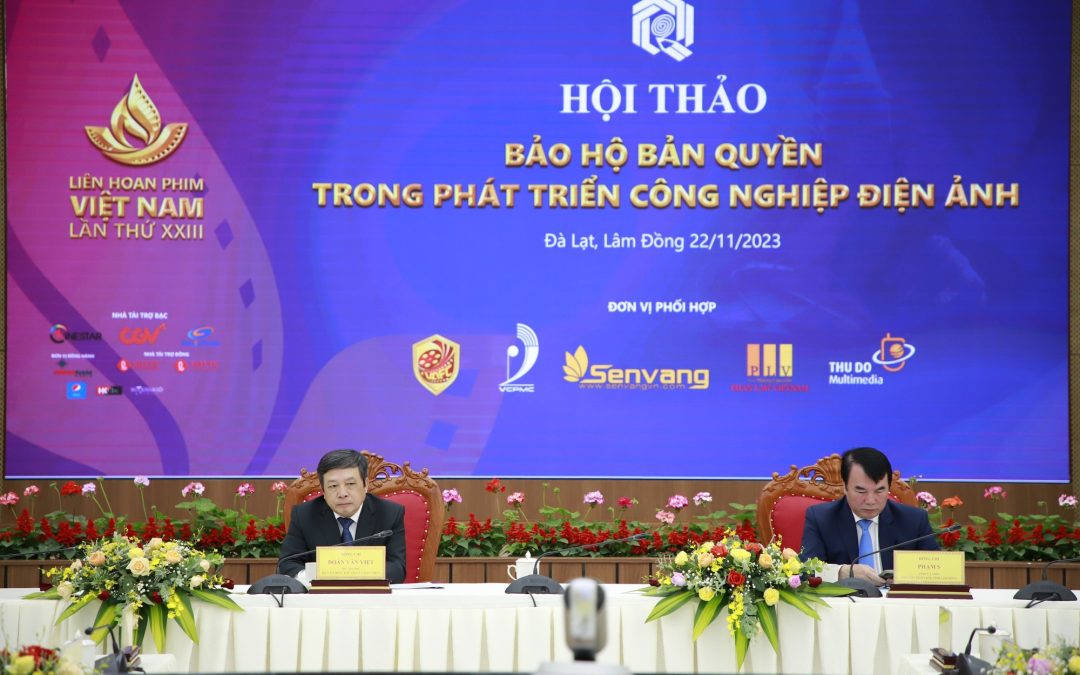The Vietnamese film industry is currently facing challenges of unauthorized copying, editing, reviewing, and livestreaming on the internet, causing frustration among filmmakers. This issue took center stage at the “Copyright Protection in the Development of the Film Industry” workshop held on November 22 in Da Lat.

Overview of the ‘Copyright Protection in the Development of the Film Industry’ Workshop – Photo: DAU DUNG
The workshop, directed by the Ministry of Culture, Sports and Tourism and organized in collaboration with the Department of Copyright, coordinated with the Department of Culture, Sports and Tourism of Lam Dong Province.
The event is part of the 23rd Vietnam Film Festival, taking place from November 21 to November 25.
Innocent Livestreaming Lawyer Quach Van Minh, the Secretary-General of the Vietnam Association for the Protection of Film and Television Copyrights (VAFC), shared insights into the emerging trend of film reviews being shared as short videos on YouTube, Facebook, or TikTok.
While reviews may seem harmless, the underlying motive is often to generate views and earn illicit profits, causing harm to the interests of film production units.
Director and producer Vo Thanh Hoa cited examples of recent films like “Lat Mat 6: Tam Ve Dinh Menh,” “Con Nhot Mot Chong,” and “Sieu Lua Gap Sieu Lai,” which have been dissected into multiple short clips and shared on social media to bypass content review algorithms.
Director Luong Dinh Dung revealed that two of his films, “578: Phat Dan Cua Ke Dien” and “Xam Do,” are being circulated blatantly on the internet. He urged audiences to consider cinema as a business product, created with both financial investment and intellectual effort from filmmakers. He raised a crucial question: “When the works of film production units are violated, who will protect them, and is there an emergency hotline for urgent help?”
Pham Thi Kim Oanh, Deputy Director of the Copyright Office (Ministry of Culture, Sports and Tourism), highlighted instances where films approved by the Film Department had not been released outside of theaters but were leaked online by someone.

The movie ‘Con Nhot mot chong’ has been cut into several small clips and broadcasted on social networks, bypassing content screening algorithms – Photo: DPCC
She cited the example of the film “Co Ba Sai Gon,” produced by Ngo Thanh Van, which was livestreamed shortly after its theatrical release. Additionally, many TV series currently airing have been recorded and widely disseminated on the internet.
Legal Challenges Doan Van Viet, Deputy Minister of Culture, Sports and Tourism, referred to survey data from the World Intellectual Property Organization (WIPO), showing that copyright-dependent industries, including the film industry, significantly contribute to the economic development of both developed and developing countries.
He cited examples such as the United States (contributing 12% to GDP), South Korea (9.89% GDP), China (7.35% GDP), Malaysia (5.7% GDP), and Thailand (4.48% GDP).
“Bolstering copyright protection plays a vital role in supporting and promoting the development of copyright-dependent industries, contributing to the rapid development of the economy, culture, and society,” the deputy minister stated.
However, with technological advancements, copyright infringement has become more sophisticated, posing numerous legal challenges, according to Pham Thi Kim Oanh.
Addressing the legal challenges, Nguyen Han, Director of Thudom Multimedia, noted that post-release protective measures are often insufficient. He likened the current situation to “releasing chickens and not being able to catch them again.” This happens when the relevant authorities lack the tools and procedures to protect rights in new conditions and contexts.
Lawyer Quach Van Minh added that although Vietnam has a relatively comprehensive legal system, including Intellectual Property Law, guiding decrees, Film Law, and administrative penalties, the fines are low and not proportional to the extent of violations and the damages suffered by film production units. Director Vo Thanh Hoa further emphasized the complexity and time-consuming nature of current procedures for handling violations.
Saving Vietnamese Cinema Experts and filmmakers proposed mechanisms, support policies, and legal improvements to enhance copyright protection and raise awareness about copyrights for the development of the film industry.
Pham Thi Kim Oanh suggested a stronger application of information technology in copyright management and enforcement. She emphasized the need for coordination with relevant foreign agencies to combat and handle copyright infringements on the internet.
A representative from Thudom Multimedia recommended encryption to protect and manage films before distribution and release. The addition of copyright marks for tracking, along with strict international distribution procedures, was also proposed. Several existing technological solutions were mentioned as capable of supporting and solving this problem.
In addition to rigorous enforcement, Lawyer Quach Van Minh suggested “blocking the ad revenue source of pirate websites.” This approach has been successful in countries like South Korea, Australia, and the UK. Representatives from the Phan Law Vietnam law firm emphasized that civil lawsuits against violators should be encouraged to prevent and warn other offenders.
Source: tuoitre.vn


Recent Comments